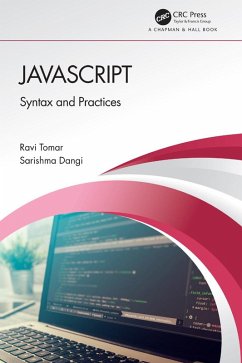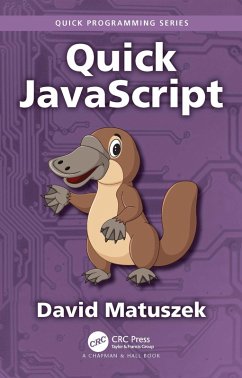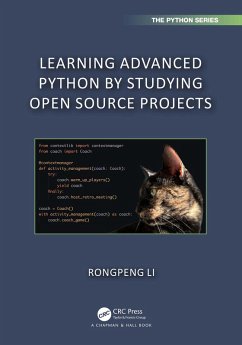
JavaScript for Data Science (eBook, PDF)
Versandkostenfrei!
Sofort per Download lieferbar
49,95 €
inkl. MwSt.

PAYBACK Punkte
25 °P sammeln!
JavaScript is the native language of the Internet. Originally created to make web pages more dynamic, it is now used for software projects of all kinds, including scientific visualization and data services. However, most data scientists have little or no experience with JavaScript, and most introductions to the language are written for people who want to build shopping carts rather than share maps of coral reefs.This book will introduce you to JavaScript's power and idiosyncrasies and guide you through the key features of the language and its tools and libraries. The book places equal focus on...
JavaScript is the native language of the Internet. Originally created to make web pages more dynamic, it is now used for software projects of all kinds, including scientific visualization and data services. However, most data scientists have little or no experience with JavaScript, and most introductions to the language are written for people who want to build shopping carts rather than share maps of coral reefs.
This book will introduce you to JavaScript's power and idiosyncrasies and guide you through the key features of the language and its tools and libraries. The book places equal focus on client- and server-side programming, and shows readers how to create interactive web content, build and test data services, and visualize data in the browser. Topics include:
All of the material is covered by the Creative Commons Attribution-Noncommercial 4.0 International license (CC-BY-NC-4.0) and is included in the book's companion website.
.
Maya Gans is a freelance data scientist and front-end developer by way of quantitative biology. Toby Hodges is a bioinformatician turned community coordinator who works at the European Molecular Biology Laboratory. Greg Wilson co-founded Software Carpentry, and is now part of the education team at RStudio
This book will introduce you to JavaScript's power and idiosyncrasies and guide you through the key features of the language and its tools and libraries. The book places equal focus on client- and server-side programming, and shows readers how to create interactive web content, build and test data services, and visualize data in the browser. Topics include:
- The core features of modern JavaScript
- Creating templated web pages
- Making those pages interactive using React
- Data visualization using Vega-Lite
- Using Data-Forge to wrangle tabular data
- Building a data service with Express
- Unit testing with Mocha
All of the material is covered by the Creative Commons Attribution-Noncommercial 4.0 International license (CC-BY-NC-4.0) and is included in the book's companion website.
.
Maya Gans is a freelance data scientist and front-end developer by way of quantitative biology. Toby Hodges is a bioinformatician turned community coordinator who works at the European Molecular Biology Laboratory. Greg Wilson co-founded Software Carpentry, and is now part of the education team at RStudio
Dieser Download kann aus rechtlichen Gründen nur mit Rechnungsadresse in A, B, BG, CY, CZ, D, DK, EW, E, FIN, F, GR, HR, H, IRL, I, LT, L, LR, M, NL, PL, P, R, S, SLO, SK ausgeliefert werden.













